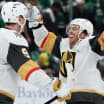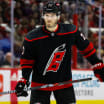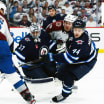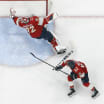Lundqvist, naming new captain among items for Rangers coach Quinn
Calls goalie 'one of best in the business' in wide-ranging conversation with NHL.com
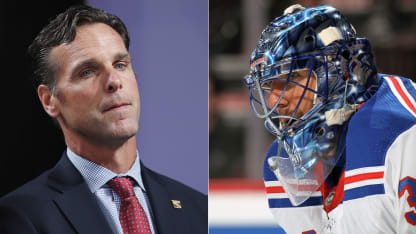
Quinn left with two impressions of Lundqvist.
"I get that [Lundqvist] is as competitive and in as good as shape as he's ever been, and I think he wants to be part of the next run we have in New York," Quinn said. "We had good conversations. We talked about a lot of different things. Listen, we're not unlike any other team, your goalie is so important in success, in all of our successes, and we're fortunate to have one of the best in the business."
A year ago Quinn, 52, never would have imagined he'd be sitting in Lundqvist's summer home talking about the Rangers, about the process of trying to turn a team that could have four or five rookies in the lineup into a Stanley Cup contender.
Quinn never thought he'd leave his job as coach at Boston University because he never figured he'd find a better opportunity elsewhere.
But the Rangers, who fired coach Alain Vigneault on April 7 after missing the playoffs for the first time since 2010, called Quinn and he couldn't pass up the chance.
He discussed the move to the NHL, what he's learned about his team so far and the possible next captain of the Rangers with NHL.com.
On transitioning from coaching in college to coaching in the NHL: "I think sometimes what can get lost in our game is simplicity. You know, there's a couple nets, there's some lines and some circles out there. Not a lot changes. Obviously, you're dealing with a different level of people and to me that's something that you've got to be cognizant of when you do get to this level. But you've got to be demanding, you've got to be fair and there's got to be clarity in what you're trying to achieve day in and day out. That's certainly our goal."
On communication with players: "Everything we do, we try to make it the best for the player. It's about putting them in the best position to have as much success as possible individually and collectively. That's our job. That doesn't mean they get the final say; I get the final say. But you've got to take into consideration their reactions to certain things. That's the way I've always done it and always will do it."
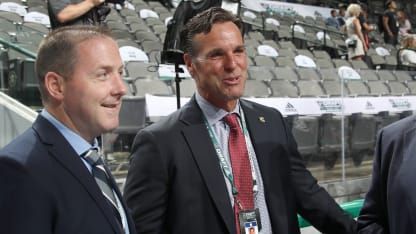
© Bruce Bennett/Getty Images
On the reaction to him, his style and his approach from players he has met with and gotten to know: "To my face everybody says it's great. No one said, 'Oh boy, we got you.' But listen, any time I think there is a new coach, and I'm sure it's happening at BU right now, there's a little bit of excitement and it goes to everybody. When we talk, I say I want to get to the bottom of what each player can do better than they did last year because obviously last year wasn't acceptable for anybody. When I sit down with the guys, I just want to know what you're going to do better than what you did last year, how are we going to make you have a better season than you did last year. When I've talked to guys, that's been the nuts and bolts of the conversation."
On preparing for training camp: "Obviously there are guys that have established themselves to a certain degree, but for me it's going to be fun to be on the ice with all these guys for the first time. I want to see who is ready to compete, who is ready to play fast, who is willing to get their nose dirty, who is going to the net, who is defending at the net, who is ready to be physical. Those are all the things you need to have success. It's a clean slate for everybody for sure, but that being said, there are guys who have established themselves and hopefully will lead the way in training camp."
On if he envisions naming a captain this season: "We've talked about it as an organization. I think a captain emerges. You don't want to put a burden on somebody that isn't ready for it. So I think that will just happen one way or the other. It either will happen that someone will emerge and separate themselves as someone who is clearly going to be the captain, or it won't happen. I think that will take care of itself."
On the Rangers style and what will look different about them from last year: "That's hard to say. Every coach has their own style and [Vigneault's] style has worked for a long time. I mean, I have so much respect for him. So, anything I say is not a knock on him, it's just how I'm going to do it and we're going to do it. We're going to be a team that wants to pressure the puck. We want to possess the puck and have it all built around good, structural defense. That's how we want to do it. We want to have five-man gaps all over the ice. We want to be on top of people and we want to make it uncomfortable for the other team. In order to do that you've got to be in world-class shape. I'm not saying we're going to be the best-conditioned team in the League because I don't know what type of shape other teams are in. I think that's unfair to other teams. I'm not saying we're going to be in better shape than last year's team either because I have no idea what type of shape they were in. I just know that we're going to do everything we can to put our team in the best position to be in world-class shape."
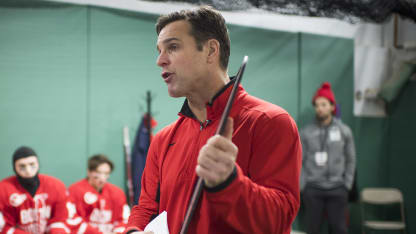
© Michael Ivins/Boston Red Sox/Getty Images
On the young players coming into camp and how many realistically can be on the team:"I think it's hard to put a number on that. I think their play is going to dictate who makes it, who sticks. The League is certainly younger. Does that mean we're going to have 12 teenagers or 20-year-olds? No, but you can have a handful and maybe a little bit more. I think it's hard to put a number on it, I really do. I used to say this when I was at BU when everybody wanted to talk about our freshman class: The juniors, seniors and sophomores are going to be the keys to the team, those are the guys that are going to drive the bus. It's no different at the NHL level. The veterans drive the bus. If the veterans can take control of the team and have years they're capable of having it certainly makes it a lot easier for the younger guys to step in and not feel that type of pressure. We have a bunch of good veterans coming back that maybe didn't have the years that they wanted to have last year and they're looking to rebound. We're asking the guys that are coming back, the veterans, to do the things they've done that have allowed them to have success at the NHL level. We're not asking a guy who has only scored 25 goals in a season in his career to score 40. We're asking the guys to do the things they've already done at this level and be consistent with it."
On what is the next step for Kevin Hayes: "He's so close to it. He's so close to being that guy and he's made so many great strides in his career so far. It's just the everyday consistency of the work ethic and the attitude. He's talked about it to me. These are his words. He wants to make the next step. Because we have so many young players, he wants to be a guy they gravitate to and can lead them down the right path. There are so many characteristics that a player and team needs to have success. You need to be mentally tough. You need to be in world-class shape. You need to be a leader. You need to be resilient. All those things you need, and he wants to take the next step in all those areas. He's made strides since he's been in New York, but I think there's another level for him to get to and he knows that. I think [a one-year contract] is a prove-it deal for any guy under a one-year deal, and he knows that."




